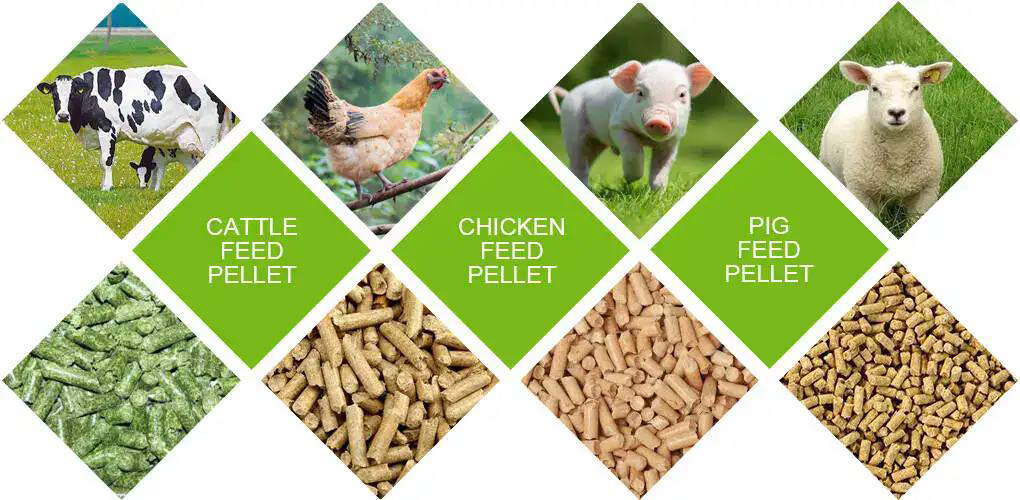feed mill plant
A feed mill plantt is a facility that actively processes raw materials into feed pellets or powder. These plants typically feature equipment such as grinding machines and mixers
feed mill plant Introduction
A feed mill plantt is a facility that actively processes raw materials into feed pellets or powder. These plants typically feature equipment such as grinding machines and mixers, used to grind and blend various ingredients (such as grains, legumes, protein sources, etc.), and then mold them into pellets or powder through a pelletizer, for consumption by livestock and poultry. The products of feed mill plants are usually formulated based on the nutritional requirements of animals and their growth stages, and adherence to relevant food safety and quality standards is necessary.


Characteristics of feed mill plant
Advanced equipment and technology
Feed milling plants are equipped with advanced grinding machines, mixers, pelletizers, and other equipment, employing advanced production technology to ensure efficient production and high-quality products.
Comprehensive quality control system
Feed milling plants establish a comprehensive quality control system, including raw material inspection, production process control, and finished product inspection, to ensure the production of feed products that meet quality standards.
Diverse formula options
Feed milling plants can provide diverse feed formula options to meet the nutritional needs and growth stages of different animals according to customer requirements.
Environmental awareness and technology application
Feed milling plants prioritize environmental protection, employing environmentally friendly production processes and equipment, and actively applying environmental protection technologies to minimize environmental impact.
Customized services
Feed milling plants can provide customized services, including formula customization and packaging customization, to meet the needs of different customers.
Experienced technical team
Feed milling plants typically have experienced technical teams with rich production experience and professional knowledge, capable of providing technical support and solutions.
Continuous innovation and improvement
Feed milling plants are committed to continuous innovation and improvement to adapt to changes in market demand, enhance product quality, and improve service levels.


Process of feed mill plant
Raw material preparation
Various raw materials such as grains, legumes, and protein sources are prepared and weighed according to the formula requirements.
Crushing and grinding
The raw materials are fed into crushers and grinding machines for crushing and grinding to achieve the desired particle size and fineness.
Mixing ingredients
The ground raw materials are mixed in a mixer according to the formula requirements to ensure thorough and uniform mixing.
Processing and shaping
The mixed materials enter pelletizers for shaping according to set molds, forming feed pellets or powder.
Drying and cooling
After forming, the feed pellets or powder undergo drying and cooling processes. This reduces temperature and humidity, enhancing product quality.
Packaging and storage
The cooled feed pellets or feed powder are packaged using packaging machines and then stored in dry, ventilated warehouses for sale or use.


Advantages of feed mill plant
High production efficiency
Feed milling plants are equipped with professional equipment and technology, enabling large-scale production and increasing production efficiency.
Controlled feed quality
Through precise formulation and strict production, feed milling plants ensure high-quality feed meeting animal nutritional needs.
Balanced nutrition
By accurately formulating feed recipes, feed milling plants cater to the nutritional needs and growth stages of different animals. This guarantees that they receive balanced nutrition.
Cost savings
By batch production and optimizing production processes, feed milling plants can reduce production costs and improve economic benefits.
Ensured food safety
Feed milling plants adhere strictly to food safety and quality standards. They ensure the safety and harmlessness of the produced feed, thereby complying with legal requirements.
Customized services
Feed milling plants can provide customized services according to the needs of customers, meeting the requirements of different farms.
Technical support
Feed milling plants usually employ skilled technical teams capable of offering support and solutions to assist customers with production challenges.
Application of feed mill plant
Typically, the production of animal feed processing plant uses raw materials such as corn, soybeans, wheat, and other nutrients as the formula. Our small feed mill plants are specially used to produce feed for poultry, livestock, pigs, horses, cattle, sheep, chickens, ducks, goose and other animals.For different animals, with different growth cycles, (chicks, suckling pigs, calves, etc.), the feed pellet size required is different, but our feed production line only needs to replace ring molds with different apertures or use a pellet crumbler to reach the required size.

Parameter of feed mill plant
| Model | Capacity | Main Motor Power | Feeder Motor Power | Conditioner Power | Dia. of Ring Die | Pellet Size |
| SZLH250 | 1-2T/H | 22KW | 0.75kw | 1.5kw | 250mm | 2-12mm |
| SZLH320 | 3-4T/H | 37KW | 1.5kw | 2.2kw | 320mm | 2-12mm |
| SZLH350 | 5-7T/H | 55KW | 1.5kw | 3kw | 350mm | 2-12mm |
| SZLH420 | 8-12T/H | 110KW | 1.5kw | 7.5kw | 420mm | 2-12mm |
| SZLH508 | 10-18T/H | 160KW | 2.2kw | 11kw | 508mm | 2-12mm |
| SZLH558 | 15-25T/H | 180KW | 2.2kw | 11kw | 558mm | 2-12mm |
| SZLH678 | 20-30T/H | 220KW | 2.2kw | 11kw | 678mm | 2-12mm |
| SZLH768 | 25-42T/H | 280KW | 2.2kw | 11kw | 768mm | 2-12mm |






